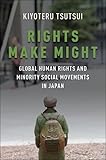Rights Make Might: Global Human Rights and Minority Social Movements in Japan
Material type: TextPublication details: New York, NY : Oxford University Press, 2018Description: 315 pages; 24 cmISBN:
TextPublication details: New York, NY : Oxford University Press, 2018Description: 315 pages; 24 cmISBN: - 9780190853105
- JC599.J3 T78
| Item type | Current library | Collection | Shelving location | Call number | Status | Date due | Barcode | Item holds | |
|---|---|---|---|---|---|---|---|---|---|
| Books | Asian University for Women Library | Non-fiction | Japanese Corner | JC599.J3 T78 (Browse shelf(Opens below)) | Available | 033027 |
Browsing Asian University for Women Library shelves, Shelving location: Japanese Corner, Collection: Non-fiction Close shelf browser (Hides shelf browser)

|

|

|

|

|

|

|
||
| HQ1762 .R48 Rethinking Japanese Feminisms | HV600 2011.T64 J36 Japan Copes with Calamity | JC421 .M73 Cold War Democracy: The United States and Japan | JC599.J3 T78 Rights Make Might: Global Human Rights and Minority Social Movements in Japan | JQ1631 .S76 Governing Japan: Divided Politics in a Resurgent Economy | JQ1640 .R86 Japan's Imperial House in the Postwar Era, 1945-2019 | JQ1681 Dynasties and Democracy : The Inherited Incumbency Advantage in Japan |
Rights Make Might examines why the three most salient minority groups in Japan all expanded their activism since the late 1970s and chronicles the galvanizing effects of global human rights ideas and institutions on local social movements. The prehistory of the three groups reveals that minority politics in Japan before the 1970s featured politically dormant Ainu - an indigenous people in northern Japan -, active but unsuccessful Koreans - a stateless colonial legacy group -, and active and established Burakumin - a former outcaste group that still faced social discrimination. Despite the unfavorable domestic political environment, the infusion of global human rights ideas and the opening of international human rights arenas as new venues for contestation transformed minority activists' movement actorhood, or subjective understanding about their position and entitled rights in Japan, as well as the views of the Japanese public and political establishment toward those groups, thus catalyzing substantial gains for all three groups. Having benefited from global human rights, all three groups also repaid their debt by contributing to the consolidation and expansion of global human rights principles and instruments. Drawing on interviews and archival data, Rights Make Might offers a detailed historical and comparative analysis of the co-constitutive relationship between international human rights activities and local politics that contributes to our understanding of international norms, multilateral institutions, social movements, human rights, and ethno-racial politics
There are no comments on this title.
